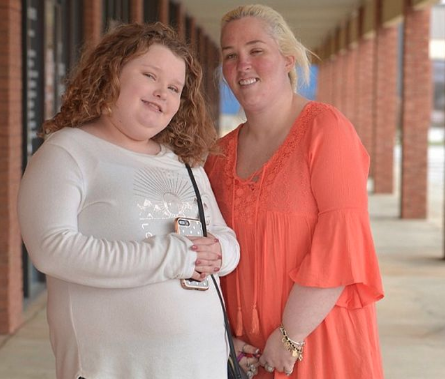What Cancer Does Anna 'Chickadee' Cardwell Have?
- Anna “Chickadee” Cardwell, the eldest daughter of 48-year-old June “Mama June” Shannon, has reportedly been diagnosed with stage 4 adrenal carcinoma.
- She first noticed stomach pain before her diagnosis.
- Adrenal Carcinoma (ACC), which is also called adrenocortical cancer, is a rare cancer that starts in one or both of the small, triangular glands (adrenal glands) located at the top of your kidneys, according to Mayo Clinic.
- The two types of ACC are Functioning ACC tumors and Nonfunctioning ACC tumors. The functioning type causes your adrenal gland to create more hormones than normal. The nonfunctioning type doesn't affect hormone production at all.
- It is unknown what type of ACC Cardwell is battling.
Cardwell’s family became famous after mom June “Mama June” Shannon and sister Alana Thompson, affectionately known as “Honey Boo Boo,” appeared on the popular TLC show “Toddlers & Tiaras” in 2011. Alana was just 5 years old at the time. Their fame led to a spin-off show, “Here Comes Honey Boo Boo,” to premiere on TLC in August 2012. The show had a four-season run but was abruptly canceled while filming the fifth season. Mama June and her then-fiance, know as Sugar Bear, also appeared on the WeTV show “Marriage Bootcamp: Reality Stars” prior to calling off their engagement in 2014.
Read MoreIn February, Cardwell underwent her first round of chemotherapy, which led to some hair loss, her family told the news outlet.

Depending on how Cardwell reacts to the treatment, doctors will decide the next steps.
Meanwhile, Cardwell’s family, who has remained “very hopeful,” has reportedly continued to stay by her side as she battles the disease. Among those supporting her are her boyfriend Elderidge and two daughters, 10-year-old Kaitlyn and 7-year-old Kylee.
Cardwell’s three siblings are 17-year-old Alana, 23-year-old Lauryn “Pumpkin” Efird, and 26-year-old Jessica “Chubbs” Shannon. They all share the same mom, Mama June, however, Cardwell previously opened up to The U.S. Sun about how she has “no relationship” with her mom.

As the cancer diagnosis news spread across the internet, fans took to Cardwell’s Instagram page to wish her well.
“Thinking of you hun. I’m not sure if it’s true what I heard. But you’ve got this hun. You’re a strong woman,” one fan commented on her most recent post, while another wrote, “Praying for you sweet Girl. You got this!”
A third fan commented, “Praying for you, Anna. You might not know us but we know you and some of us have followed you since HBB. We are all praying so hard for you to beat this.”
“Sending prayers, love, and hugs. I’m sorry you’re going through this. You’re far too young,” wrote a fourth.
What is Adrenal Carcinoma?
Adrenal carcinoma (ACC), which is also called adrenocortical cancer, is a rare cancer that starts in one or both of the small, triangular glands (adrenal glands) located at the top of your kidneys, according to Mayo Clinic. Adrenal glands make the hormones that instruct every organ and tissue in your body.
The Cleveland Clinic explains that the adrenal cortex produces hormones, including cortisol, testosterone, aldosterone and estrogen, which “control male and female traits and body functions such as blood pressure and response to stress.”
The two types of ACC are Functioning ACC tumors and Nonfunctioning ACC tumors. The functioning type causes your adrenal gland to create more hormones than normal. The nonfunctioning type doesn't affect hormone production at all.
This type of cancer can develop at any age, but children younger than five years old and adults in their 40s and 50s are most likely to be affected.
“When adrenal cancer is found early, there is a chance for cure. But if the cancer has spread to areas beyond the adrenal glands, cure becomes less likely. Treatment can be used to delay progression or recurrence,” the Mayo Clinic explains.
And although it’s unknown what exactly causes this type of cancer, this type of cancer forms when a change (mutation) occurs in the DNA of an adrenal gland cell. People born with specific genetic conditions also have a higher risk of getting this disease.
If you’re worried about a growth that has formed in your adrenal glands, you likely don’t have to stress as most growths are benign (noncancerous).
Genetic Testing What Is It and Why Is It Important?
Additionally, the cancer is extremely rare as doctors only diagnose approximately one case for every million people annually. The disease also affects more women than men.
Symptoms of Adrenal Carcinoma
Signs and symptoms of adrenal cancer, according to the Mayo Clinic, include:
- Weight gain
- Muscle weakness
- Pink or purple stretch marks on the skin
- Hormone changes in women that might cause excess facial hair, hair loss on the head and irregular periods
- Hormone changes in men that might cause enlarged breast tissue and shrinking testicles
- Nausea
- Vomiting
- Abdominal bloating
- Back pain
- Fever
- Loss of appetite
- Loss of weight without trying
Treatment Options
People diagnosed with ACC usually will first have surgery to get the tumor removed. Removal of the adrenal gland and possibly nearby tissue may also be needed via surgery.
In order to prevent cancerous cells from metastisizing (spreading) to other areas of your body, treatment plans may include radiation, chemotherapy, and immunotherapy.
The Importance of Genetic Testing
Genetic testing can help assess an individual's cancer risk by taking a deeper look into inherited gene mutations. These results can provide potentially life-saving details for patients who test positive for known mutations and who then can undergo preventative screenings and treatments for cancer.
This type of testing is conducted to find out whether a person has a specific mutation that puts them at a higher risk of developing cancer. It is recommended that when an individual is found to carry a pathogenic alteration mutation, that their blood relatives be informed and have counseling and testing. So, if you have a blood relative that is known to carry a gene mutation, talk to your doctor about genetic testing.
Should I Get Genetic Testing to Assess My Risk for Cancer?
Genetic testing can be done on samples of blood or saliva, or from a swab of the inside of a cheek. In fact, world-renowned gynecological oncologist Dr. Beth Karlan of UCLA Health tells SurvivorNet that it is as simple as spitting into a tube. The samples are sent to a lab for testing.
Genetic testing for cancer is usually done in a doctor's office (either your primary care doctor or an OB-GYN for breast and ovarian cancer gene mutations), however, there are a few tests available for people to purchase commercially.
Dr. Karlan says testing accessibility is "getting better and better, and it depends on where they (patients) live. … The way it can be done, it is really with saliva.”
Family Support Through Cancer
As Cardwell’s family and fans offer her support throughout this seemingly difficult time, it’s important to understand that having family support throughout a cancer battle can make the world of a difference.
Beverly Reeves, who was diagnosed with ovarian cancer, explained in a previous interview with SurvivorNet the importance of family and community support through a cancer battle. "If I had one piece of advice for someone who had just been diagnosed with ovarian cancer, it would be to get a strong support group together,” she said.
"Get your close friends. If you're connected to a faith community, get your faith community. Get your family. Let them know what's going on and let them help you,” Reeves added. “And sometimes that's the most difficult thing to do, but just know that they are there. If they love you, they're there to help you."
'Faith, Family, and Friends' Helped Beverly Reeves Get Through Ovarian Cancer Treatment
Contributing: SurvivorNet Staff
Learn more about SurvivorNet's rigorous medical review process.

